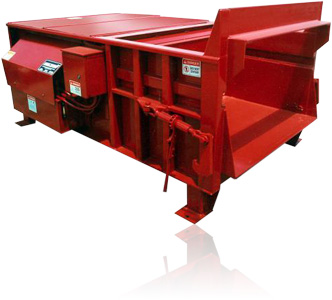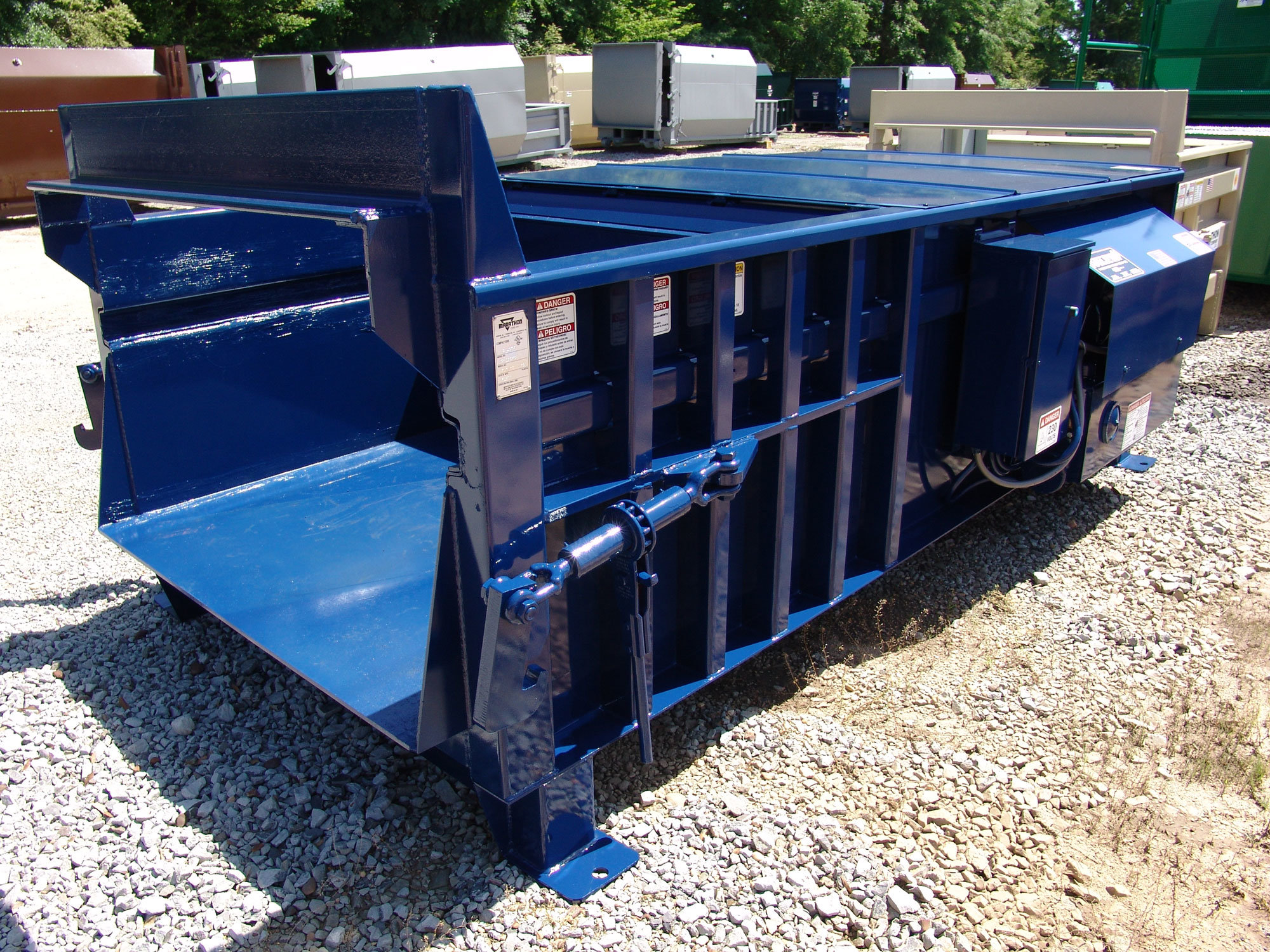A straightforward guide to maintaining Commercial trash compaction equipment
The Function of Waste Equipment in Supporting Sustainable Garbage Disposal Practices
Waste Equipment offers a fundamental function ahead of time sustainable waste disposal methods. It incorporates a series of tools developed to enhance the efficiency of waste processing, partition, and collection. By using Equipment such as compactors, shredders, and reusing containers, areas can significantly lower their dependence on land fills. The impact of these devices prolongs beyond performance. Comprehending their broader implications discloses understandings into exactly how they shape ecological responsibility and community involvement. What lies ahead in this evolving landscape?
Comprehending Waste Equipment and Its Value
Waste Equipment plays an essential function in effective waste monitoring systems. It incorporates a variety of tools and equipment made to deal with, process, and dispose of waste materials efficiently. Understanding waste Equipment is necessary for companies, communities, and businesses aiming to carry out sustainable waste disposal methods - Commercial garbage compaction equipment. Effectively functioning waste Equipment not just enhances the collection and transportation of waste yet also minimizes environmental influence by guaranteeing that waste is handled properly
The importance of waste Equipment reaches improving reusing efforts, lowering land fill use, and promoting source recuperation. Equipment such as compactors, shredders, and balers facilitate the handling of waste, making it easier to separate recyclable materials from general refuse. Additionally, advancements in waste modern technology add to the advancement of even more eco friendly remedies, consequently enhancing the commitment to sustainability. In general, waste Equipment works as a keystone for efficient waste administration, promoting a cleaner and healthier environment for future generations.
Sorts Of Waste Equipment for Effective Waste Administration
Effective waste administration depends on different kinds of Equipment created to address particular disposal needs. Amongst these, compactors play a vital role by reducing the quantity of waste, making transportation more efficient. Shredders are vital for damaging down huge things, promoting much easier handling and disposal. Additionally, balers press recyclable products right into manageable bales, enhancing storage and transportation.
Containers and containers are fundamental for gathering waste at the source, ensuring proper partition and decreasing contamination. For dangerous materials, specific Equipment, such as drum crushers and leak-proof containers, is required to guarantee safety and security and conformity with guidelines.
Finally, transport vehicles geared up with hydraulic systems boost the efficiency of waste collection and disposal processes. Each kind of waste Equipment contributes to a streamlined waste management system, advertising sustainability and decreasing ecological impact via effective disposal practices.
The Duty of Recycling Containers in Lasting Practices
Reusing bins play a necessary function in promoting sustainable techniques by promoting effective waste splitting up. By supplying assigned containers for recyclable materials, they urge individuals to take on environmentally friendly habits. This easy implementation considerably adds to reducing landfill waste and improving reusing rates.
Efficient Waste Splitting Up
Correct waste separation plays a vital function in promoting lasting techniques, and recycling containers offer as a significant device in this procedure. By plainly distinguishing in between recyclables, compostables, and general waste, these bins help with efficient sorting, minimizing contamination and maximizing reusing effectiveness. Their strategic placement in exclusive and public spaces urges individuals to join accountable garbage disposal. The use of color-coded bins helps to simplify the separation procedure, making it user-friendly for individuals. This business technique not just boosts recycling rates however additionally elevates recognition concerning the value of waste management. Basically, reusing containers are essential elements that sustain reliable waste separation, inevitably contributing to a much more sustainable setting and lowering the total pressure on land fills.
Encouraging Eco-Friendly Habits
Individuals might be inclined to overlook their impact on the atmosphere, the visibility of recycling containers significantly influences environment-friendly actions. These bins function as aesthetic pointers, motivating individuals to different recyclables from basic waste. Their calculated positioning in public rooms advertises access, making it less complicated for individuals to adopt sustainable methods. Studies show that when reusing containers are offered, reusing prices boost substantially, showing a direct correlation between facilities and actions. On top of that, colorful signage on these bins informs customers about what products can be recycled, minimizing contamination prices. By cultivating a society of recycling, these bins not only help with appropriate waste management yet also influence a collective obligation toward ecological stewardship, eventually adding to a much more lasting future.
Composting Equipments: Turning Waste Into Resources
Composting systems offer as an important tool in transforming natural waste right into useful resources, providing countless ecological advantages. Various sorts of composting Equipment deal with various demands, making the process obtainable to both areas and people. Recognizing the composting procedure is vital for maximizing its performance and promoting lasting waste management practices.
Advantages of Composting Equipments
Several communities are increasingly acknowledging the numerous advantages of composting systems, which transform natural waste right into useful resources. These systems properly lower landfill waste, therefore lowering greenhouse gas emissions and preserving natural deposits. By transforming food scraps, yard waste, and other natural materials into nutrient-rich garden compost, they boost dirt health and fertility, advertising lasting farming techniques. Composting helps to keep dampness in the soil, minimizing the need for chemical fertilizers and watering. It promotes biodiversity by providing an environment for helpful microorganisms and bugs. In addition, composting educates people about environmental stewardship, encouraging a society of sustainability. Overall, composting systems play an essential duty in developing a round economy, where waste is minimized, and sources are reused.
Sorts Of Composting Equipment
A variety of composting Equipment is readily available to facilitate the efficient processing of organic waste right into important garden compost. These systems range from simple yard garden compost bins to sophisticated commercial composters. For home usage, tumblers right here and fixed containers are popular, permitting workable aeration and blending. Oxygenated fixed heaps use blowers to boost airflow, significantly accelerating decay. Large-scale procedures may utilize in-vessel composters, which regulate temperature level and humidity for optimal composting conditions. Worm composters, or vermicomposting systems, harness the natural gastrointestinal processes of worms to damage down natural matter. Furthermore, shredders and chippers help prepare materials by reducing size, promoting faster break down. Each kind of Equipment serves specific requirements, allowing varied composting techniques that add to lasting waste administration.
Composting Process Explained
The composting procedure transforms organic waste into nutrient-rich resources through a collection of biological and chemical reactions. Originally, microorganisms such as fungis and microorganisms break down natural materials, consisting of food scraps and lawn waste. This decomposition creates heat, helping with additional microbial activity and speeding up the breakdown procedure. As the garden compost matures, the temperature decreases, enabling advantageous organisms to flourish. The visibility of oxygen is essential, promoting cardiovascular problems that boost microbial you could try these out effectiveness. Throughout this procedure, carbon-to-nitrogen proportions need to be maintained to maximize decay. The end result is humus, a dark, crumbly compound abundant in nutrients, which can be made use of to enrich soil, assistance plant development, and add to lasting agricultural practices.
Ingenious Technologies in Waste Collection and Disposal
As cities face increasing waste quantities and ecological issues, innovative technologies in waste collection and disposal emerge as important services. Smart waste containers furnished with sensors track fill levels, optimizing collection paths and decreasing gas usage. These containers can likewise interact with waste administration systems, facilitating prompt pickups and reducing overflow concerns. On top of that, autonomous automobiles, including drones and robot systems, are being deployed to improve operational performance in waste collection.
Innovations in arranging modern technologies, such as expert system and artificial intelligence, allow much more reliable reusing procedures by swiftly determining and separating materials. Furthermore, waste-to-energy modern technologies transform natural waste into renewable resource, decreasing land fill dependence and adding to energy sustainability. These advancements not only streamline waste administration techniques but additionally advertise a circular economy, therefore cultivating a sustainable method to garbage disposal. Ultimately, the integration of these modern technologies plays an essential function in addressing urban waste challenges and enhancing environmental stewardship.
Neighborhood Interaction Via Waste Equipment
While reliable waste monitoring counts greatly on advanced modern technologies, neighborhood interaction through waste Equipment plays an important role in cultivating lasting techniques (Commercial garbage compaction equipment). Waste Equipment, such as recycling containers and composting stations, serves not just as practical devices however also as catalysts for neighborhood awareness and engagement. By positioning these resources in available areas, towns motivate individuals to take an active role in waste reduction and recycling initiatives
Educational campaigns accompanying waste Equipment setups can even more enhance community participation, guiding homeowners on correct disposal approaches and the advantages of sustainable methods. Additionally, neighborhood events that use waste Equipment, such as clean-up drives and view publisher site recycling difficulties, motivate collective activity and develop a feeling of responsibility amongst neighborhood participants.

The Future of Waste Monitoring and Lasting Solutions
Developments in modern technology and shifts in societal attitudes are shaping the future of waste monitoring and lasting services. Smart waste administration systems, making use of IoT devices, are allowing real-time monitoring of waste levels, optimizing collection courses, and decreasing carbon footprints. These improvements not only improve performance however likewise promote recycling and composting campaigns by giving data-driven understandings.
Moreover, the surge of circular economic climate techniques encourages firms to rethink item style, concentrating on reusability and recyclability. This change promotes a culture of sustainability, where customers are increasingly demanding environmentally friendly items.
Neighborhood participation in waste monitoring is coming to be significantly essential, with instructional programs encouraging individuals to take responsibility for their waste. As governments worldwide execute more stringent regulations on waste disposal, areas and companies are motivated to adopt sustainable techniques. Together, these components lead the method for a future where waste is reduced, and sources are preserved, guaranteeing a much healthier earth.
Frequently Asked Questions

Exactly How Can Businesses Profit Monetarily From Spending in Waste Equipment?
Buying waste Equipment can result in significant monetary benefits for services. By enhancing performance, decreasing disposal expenses, and improving reusing capacities, business can reduce functional expenditures and potentially create profits through recuperated products.
What Laws Regulate making use of Waste Equipment in Different Regions?
Various laws govern waste Equipment use, differing by area. These consist of environmental criteria, security methods, and functional standards, aimed at ensuring conformity, advertising public wellness, and minimizing ecological effect linked with waste administration techniques.
Just how Do I Select the Right Waste Equipment for My Demands?
Selecting the ideal waste Equipment demands assessing specific waste types, volume, and disposal techniques. Researching readily available options, seeking advice from specialists, and taking into consideration governing conformity will assist in making an informed decision customized to specific requirements.
What Are the Ecological Influences of Inefficient Waste Equipment?
Ineffective waste Equipment can result in boosted emissions, higher power consumption, and greater landfill overflow. It commonly causes improper waste segregation, exacerbating pollution and adversely influencing ecosystems, which eventually hinders lasting waste administration efforts.
Exactly How Can Waste Equipment Be Preserved for Optimal Performance?
Waste Equipment can be maintained for peak efficiency with normal assessments, prompt repair work, appropriate cleansing, and adherence to manufacturer guidelines. This ensures efficiency, extends Equipment life-span, and lessens ecological impact throughout waste management processes.
Waste Equipment plays a crucial function in effective waste administration systems. Comprehending waste Equipment is crucial for companies, communities, and organizations intending to carry out lasting waste disposal techniques. While efficient waste monitoring counts heavily on sophisticated innovations, community interaction through waste Equipment plays an important function in cultivating lasting practices. Neighborhood participation in waste management is becoming increasingly crucial, with educational programs empowering people to take responsibility for their waste. Choosing the proper waste Equipment requires examining particular waste kinds, quantity, and disposal methods.